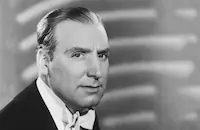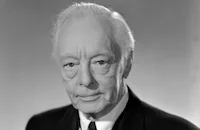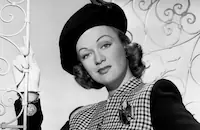That Uncertain Feeling

Brief Synopsis
Cast & Crew
Ernst Lubitsch
Merle Oberon
Melvyn Douglas
Burgess Meredith
Alan Mowbray
Olive Blakeney
Film Details
Technical Specs

Synopsis
Suffering from insomnia and an acute case of hiccups, New York City socialite Jill Baker, the wife of an ambitious insurance executive, consults with the eminent psychoanalyst Dr. Vengard. Although Jill and her husband Larry are known to their Park Avenue social set as "the happy Bakers," Jill becomes distressed when Dr. Vengard questions her about her marriage, and, by the time she leaves his office, her hiccups have returned. At home, Jill faces the fact that her marriage is less than ideal when Larry, obsessed with his work, returns from the office and fails to notice that Jill has spent the entire day at the beauty salon. Jill, unable to convey her unhappiness, coolly asks Larry to stop poking her in the stomach while exclaiming "keek," a habit he thinks is endearing, but she finds annoying. On her next visit to Dr. Vengard, Jill meets a fellow patient, the cynical and brooding pianist Alexander Sebastian, who is being treated for "artistic inhibition." Sebastian, a misanthrope who habitually expresses his disdain for the world by muttering "pfui!" to himself, teases Jill after he spies a photograph of "the happy Bakers" in a society gossip magazine. Jill, fascinated by Sebastian's disregard for social conventions, accepts his invitation to a nearby art gallery. Impressed by Sebastian's worldliness, Jill invites him to a dinner party she is hosting for one of Larry's prospective clients, a Hungarian mattress manufacturer to whom Larry hopes to sell a large insurance policy. Although Sebastian insults Larry's taste in home decor and interrupts his sales pitch with his piano playing, the evening is a great success. However, after Larry goes to bed, Sebastian serenades Jill on the piano until dawn, and then kisses her. As Jill begins to immerse herself in art and music, her insomnia and hiccups disappear, but Larry grows worried that he might lose her to Sebastian. Jones, Larry's sympathetic attorney and friend, tells him to forget about insurance policies and work on selling himself to his wife before it is too late. That afternoon, Larry comes home early unexpectedly and is furious to find the obnoxious Sebastian wooing Jill under his own roof. Realizing that Jill is blindly infatuated by Sebastian's self-proclaimed artistic genius, Larry uses reverse psychology and pretends that he is willing to give her up, claiming that he too has become involved with another woman. After consulting a divorce lawyer, Larry moves into a hotel and Jill installs Sebastian in their apartment, where he spends most of his time pounding on the piano and complaining. When Sebastian leaves the apartment to pout after a petty argument, Jill, weary of his temper tantrums, visits Larry and begs for another chance, but Larry, wishing to make Jill suffer just a bit more, pretends that he has a woman in his room and is currently unavailable. As she is about to leave, Jill discovers to her delight that Larry is lying and, now certain that he still loves her, asks him for a farewell kiss, knowing that he will be unable to resist. Returning to the Baker apartment late that night, Sebastian begins loudly playing the piano in the dark and is shocked when Larry emerges from the bedroom in his pajamas to request that he play more softly. After collecting the numerous photographs of himself scattered about the Bakers' living room, Sebastian leaves in a huff, muttering one final "pfui!" on his way out. Larry locks the door securely behind him and then returns to Jill's awaiting arms.

Director

Ernst Lubitsch
Cast

Merle Oberon

Melvyn Douglas

Burgess Meredith

Alan Mowbray

Olive Blakeney

Harry Davenport

Sig Rumann

Eve Arden

Richard Carle
Mary Currier
Jean Fenwick
Crew
George Barnes
Barney Briskin
Flato
A. E. Freudeman
Merritt Gerstad
Alexander Golitzen
Werner R. Heymann
Horace Hough
Irene
Arthur Johns
Sol Lesser
Ernst Lubitsch
Walter Reisch
William Shea
John Sherwood
Lee Sholem
Donald Ogden Stewart

Videos
Movie Clip



Hosted Intro
Film Details
Technical Specs

Award Nominations
Best Score
Articles
That Uncertain Feeling
It's a screwball comedy about an unhappily married couple, Merle Oberon and Melvyn Douglas, with Oberon seeking psychiatric help when the mere mention of marriage causes her to fall into fits of hiccups. With the arrival of eccentric pianist Burgess Meredith, a romantic triangle ensues. In all, it's one of Lubitsch's lesser films, but even lesser Lubitsch is better than most, and his famed "Touch" is on display, as in the sequence where Oberon tries to trap a nonexistent woman in Douglas's hotel room.
That Certain Feeling was the first picture Lubitsch made under the new independent production company he'd formed with producer Sol Lesser. Their distribution deal with United Artists called for them to deliver two films a year, but the partnership was short-lived. That Uncertain Feeling opened to mediocre business, perhaps because the story was rather weak, and mixed reviews, with The New York Times saying, "Whipped up by those master confectioners Ernst Lubitsch and [writer] Donald Ogden Stewart, it is so light that were one to breathe on it, it quite probably would vanish." One consolation, however, was the fact that Werner Heymann's score was nominated for an Academy Award.
Lesser and Lubitsch parted ways after this one picture, but years later Lesser explained that the reason wasn't just because the movie hadn't been a hit. Lubitsch was not happy being on his own, said Lesser, and he missed "contact with the stars and other professionals he associated with at MGM." Lubitsch still owed UA one more movie under his deal, and it would be one of his great ones, To Be or Not to Be. After that, Lubitsch went to Twentieth Century Fox for the remainder of his career, before his untimely death of a heart attack in 1947.
Despite the indifferent reception That Uncertain Feeling received, the cast treasured its experience with the master director and the atmosphere he created on set. Burgess Meredith later recalled, "I don't know when I had a better time in my whole career than during that period. [Lubitsch] was very psychic. I'd fall down laughing because right away he'd improvise, in the middle of a scene he was doing for me, some very personal thing about my life, with his big cigar in his mouth, and he knew I'd come over and say, 'How did you know about that?' And he'd say, 'I have ways of knowing.'"
Melvyn Douglas said working with Lubitsch on three films (Angel, 1937, Ninotchka, 1939, and That Uncertain Feeling) was one of the highlights of his career because the director worked with his actors painstakingly and intensely. "He collaborated with his actors," said Douglas. "Lubitsch usually gathered the cast together to look at the day's shooting, and often re-did scenes which could be improved. He used to maintain that time spent on rehearsing more than paid for itself in increased actor involvement once the cameras started to roll."
Regarding the product placement of the DeBeers diamonds: The DeBeers company allowed Hollywood to use their diamonds as props in exchange for certain restrictions on how the diamonds were used. DeBeers mandated that the diamonds always be used as romantic gifts, always from the man to the woman (not as a joint purchase), and always as a surprise. This was part of a very successful strategy to increase diamond sales in post-depression America.
Producer: Ernst Lubitsch, Sol Lesser
Director: Ernst Lubitsch
Screenplay: Walter Reisch, Donald Ogden Stewart, Victorien Sardou (play), Emile DeNajac (play)
Cinematography: George Barnes
Film Editing: William Shea
Art Direction: Alexander Golitzen
Music: Werner R. Heymann
Cast: Merle Oberon (Mrs. Jill Baker), Melvyn Douglas (Larry Baker), Burgess Meredith (Alexander Sebastian), Alan Mowbray (Dr. Vengard), Olive Blakeney (Margie Stallings), Harry Davenport (Jones).
BW-84m.
by Jeremy Arnold

That Uncertain Feeling
Quotes
Trivia
Ernst Lubitsch and Sol Lesser had formed a partnership, Ernst Lubitsch Productions, Inc., but it was dissolved when this movie did poorly at the box office.
The original play, "Divorcons", opened in Paris on 6 December 1880.
There are few close-ups of Merle Oberon in this film - she was recovering from her second bout of cosmetic poisoning, which had left pits and sores in her face and could not be covered with makeup.
Notes
Although Fritz Feld is included as a cast member on Hollywood Reporter production charts, his name is not listed on the film's credits or in reviews, and his appearance in the completed film is doubtful. According to a NYT article dated December 15, 1940, director Ernst Lubitsch, who had formed Ernst Lubitsch Productions, Inc. with Sol Lesser in 1939, bought the rights to the French play Divorçons, in addition to four adaptations, from Paramount Pictures for $27,000, and then proceeded to "ignore them all."
That Uncertain Feeling was the first of two films Lubitsch and Lesser planned to make for distribution by United Artists. According to a modern interview with Lesser, Lubitsch found that he disliked working as an "independent" and missed the close contacts he enjoyed with stars and other professional colleagues during his tenure at M-G-M. Lesser and Lubitsch agreed to end their partnership when reviews and box office receipts for That Uncertain Feeling proved disappointing, and Lubitsch Productions was dissolved in 1943. The film was nominated for a 1941 Academy Award for Best Scoring of a Dramatic Picture.
Four previous adaptations of Sardou's play had been filmed: 1915's Divorçons, produced by Biograph and distributed by General Film Co.; 1918's Let's Get a Divorce, a Famous Players-Lasky Corp. production directed by Charles Giblyn and starring Billie Burke and John Miltern (see AFI Catalog of Feature Films, 1911-20; F1.1059, F1.2455); 1925's Kiss Me Again, a Warner Bros. film directed by Lubitsch and starring Marie Prevost and Monte Blue; and 1927's Don't Tell the Wife, another Warner Bros. version (see AFI Catalog of Feature Films, 1921-30; F2.2896, F2.1411).

Miscellaneous Notes
Released in United States 1941
Remake of Lubitsch's silent film "Kiss Me Again" (1925).
Released in United States 1941














